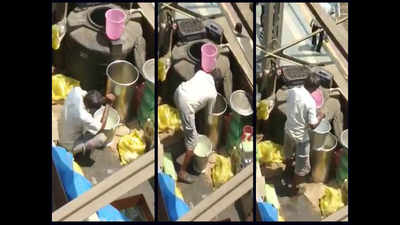- News
- City News
- mumbai News
- Faecal bacteria found in lemon juice at Kurla station
Trending
This story is from April 13, 2019
Faecal bacteria found in lemon juice at Kurla station

CR bans sale of lemon and artificial juices at stations after the video of unhygienic preparation of lemon juice at a stall on platform no 7/8 at Kurla station
MUMBAI: The apprehensions have come true. A laboratory test has found coliform bacteria, including E coli, in the lemon juice that was being prepared by a man using his bare hands at a foodstall at Kurla station last month. Coliform indicates the presence of faecal matter in the juice.

The video, apparently recorded by a commuter, showed the man using water from the tank placed over Chamanlal and Son Tea Stall on platform numbers 7 and 8.The person was also seen squeezing lemons in a drum and stirring the mixture with his bare hands. The video went viral on social media after the commuter tagged the Central Railway.
On March 25, authorities sealed stall, took samples of the lemon juice and sent them for examination to a BMC-run laboratory. “The sample of lemon juice was found to be unsafe for human consumption,” states the report.
A senior CR official said, “We will impose Rs 5 lakh fine on the canteen contractor for the juice contamination.”
CR’s commercial department had earlier allowed sale of lemon juice at its static and mobile units.

The video, apparently recorded by a commuter, showed the man using water from the tank placed over Chamanlal and Son Tea Stall on platform numbers 7 and 8.The person was also seen squeezing lemons in a drum and stirring the mixture with his bare hands. The video went viral on social media after the commuter tagged the Central Railway.
On March 25, authorities sealed stall, took samples of the lemon juice and sent them for examination to a BMC-run laboratory. “The sample of lemon juice was found to be unsafe for human consumption,” states the report.
Coliform bacteria, which is found in faecal matter, can cause diarrhea, vomiting and fever, among other health issues. E coli, short for Escherichia coli, a type of coliform, is naturally present in the digestive tracts of humans and certain animals—while some strains are harmless, a few can cause food poisoning. Another coliform found in the juice originates in soil, sewage, food and the intestinal tracts of animals and humans. This bacterium is responsible for causing infections of blood, as well the respiratory and urinary tracts.
A senior CR official said, “We will impose Rs 5 lakh fine on the canteen contractor for the juice contamination.”
CR’s commercial department had earlier allowed sale of lemon juice at its static and mobile units.
End of Article
FOLLOW US ON SOCIAL MEDIA










